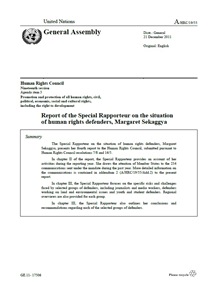This new report, based on communications sent between 2007 and 2011 by the mandate holder, provides additional evidence and sheds further light on the widespread human rights violations suffered by those who peacefully and non-violently promote land and natural resource rights. This is particularly true for those who are organised in grassroots organisations or social movements, which face specific difficulties vis-à-vis state authorities and powerful non-state actors.
The report includes the following paragraphs related to defenders working on land and environmental issues:
- International human rights framework and approach of the mandate holder
- Activities, risks and challenges faced by defenders working on land and environmental issues
- Defending land and environmental issues in connection with extractive industries and construction and development projects
- Defenders working for the rights of indigenous peoples and minorities
- Women defenders working on land and environmental issues
- Journalists working on land and environmental issues
Margaret Sekaggya lists an impressive number of violations, including killings, attempted killings, attacks, assault and ill-treatment, excessive use of force (during demonstrations), threats, different forms of intimidation, harrasment, raids to houses, arrest, arbitrary detention, stigmatisation (through campaigns against land/human rights defenders), discreting campaigns/defamation, criminalisation.
With regard to the types of activities triggering violations, the Special Rapporteur mentions: i) representation of affected groups at national level; ii) participation in negotiations w/ authorities on matters such as land disputes (representing affecting communities); iii) investigations of cases of land deals / land grabbing; iv) defence of rights of affected communities, IPs, etc; v) campaigns against forced evictions; vi) campaigns for raising awareness on HR violations, on the rights of affected groups / farmers / land users and owners; vii)submission of information to national, regional or international human right organisations; viii) making and dissemination video documentary; ix) writing articles and reports on cases of land-related human rights violations.
The conclusions of the Special Rapporteur follow:
123. Defenders working on land and environmental issues are also highly exposed to attacks to their physical integrity, often by non-State actors, and many are killed because of their work on the environmental impact of extractive industries and development projects, or the right to land of indigenous peoples and minorities. The Americas seems to be the region where these defenders are most at risk.
124. States should give full recognition to the important work carried out by defenders working on land and environmental issues in trying to find a balance between economic development and respect of the environment, including the right to use land, natural wealth and resources, and the rights of certain groups, including indigenous peoples and minorities.
125. States should not tolerate the stigmatization of the work of these defenders by public officials or the media, particularly in context of social polarization, as this can foster a climate of intimidation and harassment which might encourage rejection and even violence against defenders.
126. States should combat impunity for attacks and violations against these defenders, particularly by non-State actors and those acting in collusion with them, by ensuring prompt and impartial investigations into allegations and appropriate redress and reparation to victims.

